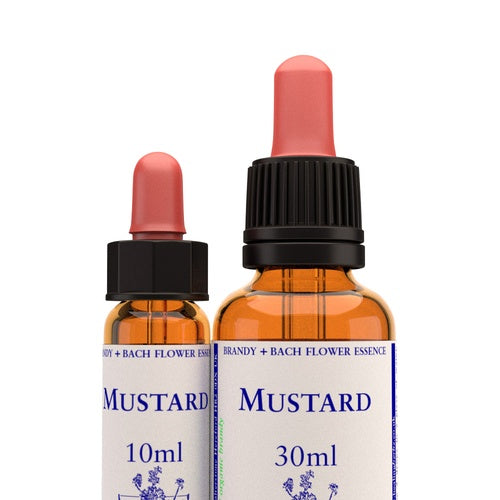Mustard
Mustard
£4.80
Mustard details
Latin Name: Sinapis arvensis
Group: Second Nineteen
Emotional Group: Insufficient interest in present circumstances
Emotional response: Depression
Method: Boiling
Indication
Those who are liable to times of gloom, or even despair, as though a cold dark cloud overshadowed them and hid the light and the joy of life. It may not be possible to give any reason or explanation for such attacks. Under these conditions it is almost impossible to appear happy or cheerful. [Bach: Twelve Healers and Other Remedies 1936]
Affirmation
In all things cheerfulness should be encouraged, and we should refuse to be oppressed by doubt and depression, but remember that such are not of ourselves, for our Souls know only joy and happiness. [Bach: Collected Writings]
Emotional State
For depression that comes for no apparent reason from an unknown cause, gloom, deep sadness, melancholy, usually serious people who feel that they suffer periodic affliction from a malefic star. Depression is intense and cannot be alleviated until it lifts as unexpectedly as it came. All joy and peace is driven out of life for the duration. [Barnard: Guide to the Bach Flower Remedies]
Habitat
General
Mustard is most commonly found on the verges of new roads. It avoids acid soils.
Britain
Mustard is a common weed on arable land throughout Britain causing considerable problems for farmers; consequently it is being cut, sprayed and generally attacked. But since it reappears every time the soil is disturbed it is not too difficult to find.
Mustard - Form and Function
As an emotional state Mustard is a kind of depression which waits, unseen, for an opportunity to surface. Its origins will have been in the past, buried deeply, even beyond memory. By looking at the natural history of the plant we can conclude two things about this. One, that the darkness which clouds the ‘light and joy of life’ comes from within the earth; it is born of past experiences, karma if you will, which the individual carries as unresolved material, the un-germinated seeds. To use another analogy, it is like the psychological baggage many of us carry, filled with we know not what. The second point is this: the Mustard plants only develop at a time when the field is left empty, the soil bare. The Mustard state follows disturbance of the settled pattern of life (ploughing) and only takes root in the mind because there is some inactivity in the will (an empty field). It is for this reason that Mustard is alongside Honeysuckle and Wild Rose in the sequence of discovery – Nora Weeks puts Mustard there and so did Bach, in the group for Not Sufficient Interest in Present Circumstances.
Mustard, then, is an opportunist pattern of interference, a form of possession, which takes up residence only because of the weakness of the host. This idea is hinted at by some writers who speak of dark forces overshadowing the soul, of separation and a fall from grace. The image of an empty, ploughed field or even upturned earth, invites such thoughts. There is something unnatural about land devoid of all plants and today, when farmers spray fields with weed-killer, before planting and ploughing, we must wonder as to the effect on the psyche of the planet. Eradicate all plants from a field and what will then enter? The psyche of the planet may be too abstruse a concept but the complex relationships of plant to earth, of biodiversity and subtlety in thought are the very things forced under by the bulldozer of materialism. The farmer increases his yield at harvest by removing unwanted competition from weeds: charlock hardly grows in arable land today. But does its extinction as a species leave us less protected from the ‘cold, dark clouds’ of depression?
£4.25/10ml
Ask us anything
We are happy to answer any questions you may have about our product.
You may also like
Subscribe to our newsletter
Promotions, new products and sales. Directly to your inbox.
Quick links
Contacts
01947 606565
totallynaturalskincare@outlook.com
152 Church street Whitby North Yorkshire YO22 4BH




